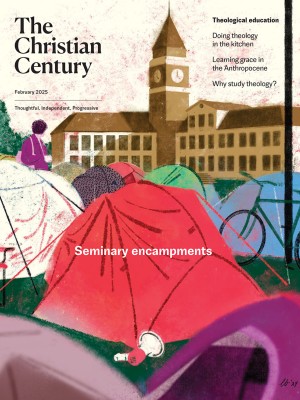The religious practice of community organizing
Aaron Stauffer offers a nuanced study of the radical social gospel and broad-based organizing.

Listening to the Spirit
The Radical Social Gospel, Sacred Value, and Broad-Based Community Organizing
We’re in desperate need of broad-based community organizing these days. Many of the most tangible injustices in our world, both large and small, appear to be unresolvable through straightforward political means. We receive hints here and there of the revitalization of worker organization and unions, but the news is mixed. (For example, while 2023 saw a 200,000-person increase in workers represented by unions, those numbers represent a slight decrease in the share of unionized workers.)
Into this scene, Aaron Stauffer interjects his study of the radical social gospel and broad-based community organizations, a widely successful model of local political organizing supported by churches. Stauffer maintains that at the heart of BBCOs are the relational meeting, “a public, value-directed conversation between two people on what they care most about in their community and what they are willing to do to fight for and protect those values, goods, and people,” and the listening campaign, “a series of relational meetings carried out within a single institution or organization with the aim of identifying the institution’s core values and issues.”
Read our latest issue or browse back issues.
Two of the most recognizable names in BBCOs are Saul Alinsky and Barack Obama. Alinsky is often heralded as the founder of this particular style of organizing, having published the widely read Rules for Radicals in 1971. Obama famously began his political career doing such work in Chicago in the 1980s with the Industrial Areas Foundation, which Alinsky founded.
In this study, Stauffer uses auto-ethnography to examine his own decades-long BBCO experience in San Antonio and Nashville. He then makes what he calls a social ethical and political theological case “for how Christians can graft their democratic organizing into a long tradition of radical social gospelers whose politics of sacred value led them to the heart of radical and progressive political and economic movements.” I especially appreciate Stauffer’s designation of BBCOs as “counterpublics,” a term I’ve often considered using to describe churches, which have the potential to stand as an alternative to the current political morass and the capitalist takeover of everything. Counterpublics, Stauffer writes, are “discursive arenas that contest dominating interpretations of a group’s identities but can consist of members from all sectors of society.” With a little translation, that’ll preach.
Stauffer’s book adheres to a basic assumption I share, one articulated by Stauffer’s mentor Gary Dorrien in Social Ethics in the Making: “Christianity has a social-ethical mission to transform the structures of society in the direction of social justice.” The radical question before us in 2025 is how. The radical doubt we may have is whether we can. What Stauffer refreshingly brings to the table in this work is a practical account—not of how to win elections but rather of how doing broad-based organizing as a religious practice can serve as a politics of sacred value inspired by such things as Christian socialism and the radical social gospel.
Stauffer’s most original contribution is his argument for the role of sacred value in BBCOs. Essentially, he identifies what are typically perceived as secular actions—listening campaigns and relational meetings—as religious practices. By blurring the distinction between the religious and the secular, Stauffer is proposing an understanding of broad-based community organizing nuanced enough to encompass many religious traditions and even those who do not identify as religious. In other words, he proposes a format and shape for the discernment of sacred value that takes account of the emergence of our truly secular age.
I would be remiss not to mention that although this is a work of academic reflection, it remains profoundly situated in class-based organizing and mindful of it. I appreciate the brief but powerful moments throughout the book when Stauffer reminds us of the center about which he writes: “Broad-based organizing is organizing for radically democratic power by working people for working people’s communities.” Readers of this book will find themselves inspired to reenvision their own relationship to such communities—and perhaps to consider supporting worker organization in a deeper way.
In addition, as I read this book, I found myself reinvigorated for ministry, committed to bringing relational meetings and listening campaigns more intentionally back into my own pastoral practice. Since the pandemic, I (like many) have tended to retreat into digitally mediated spaces and the more private tedium of daily work. Stauffer has provided exactly the kick in the pants I needed to get out and be with people more.





